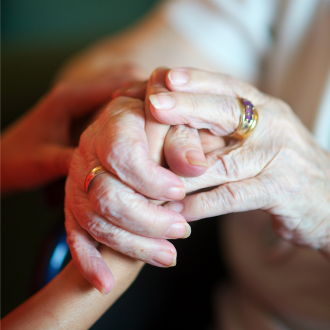A day specialising in end-of-life care

Profile: Dr Julie Barker
Age 53
Role GP principal, end of life (EOL) lead for Newark and Sherwood CCG and a Macmillan GP
Hours per week 36 hours clinical, four hours as EOL lead and six to eight hours as a Macmillan GP
9:00
I kick off my day with a meeting with our CCG clinical chair lead. As two CCGs are merging functions we need to review my role as the end of life (EOL) clinical lead. We discuss ways in which we can improve the effectiveness in our clinical leadership and commissioning via a discussion forum. Our idea is simple: create a much clearer line of communication with other key CCG teams – for example the mental health, children’s and diabetes teams.
I love the fact that not every day has the same routine.
9:30
Next on my agenda, this time with my Macmillan hat on, is a visit to the Ashfield ‘health village’ for a cancer team meeting. At the edge of our ‘patch’, this site was built several years ago when money in the public sector was not a myth.
It’s a wonderful resource that enables public and third sector organisations to come together and brainstorm ideas, for example allowing the self-care hub and the Citizens’ Advice Bureau to work together more closely. Although not yet fully functional, the village has integrated with almost all relevant local services.
We update on the huge amount of transformational work for cancer services. It’s only been two days since the last meeting, but another small NHS England funding pot for Vanguard sites working on cancer service innovation the sites has been publicised with an astonishingly small, two week timescale. There is a huge amount of administrative input required for a £200m pot for the whole country. It’s no wonder that small proportions of national funding get to the front line.
Macmillan could teach the Department of Health a thing or two – their strategy is clear and pro-active, developed to be patient-focused and clinician led, with excellent resourcing and a solid model of sustainability.
12:30
I eat my lunch en route to Nottinghamshire’s Advisory EOL meeting. As I drive I think of a patient who died recently from mesothelioma. It’s been two weeks and I’m still waiting to hear from the coroner whether I will be able to write his death certificate. The patient’s sudden deterioration had been a shock to all as he’d never smoked and had lived a healthy life. He had suffered a few weeks of fatigue and shortness of breath before being diagnosed and within months he’d passed away. It was a privilege to support him and his wife through his final journey as his GP. I know that I will continue to support her as she lives with his loss, but the delay does not help matters.
My roles in Macmillan and EOL lead have meant that I‘ve unearthed a greater understanding of issues faced by cancer patients which has improved my ability to effectively respond to the patients need.
14:00
I meet with other CCG clinical EOL leads and relevant clinicians, chaired by our county public health consultant. Together we have helped steer and develop several key initiatives to improve end of life care for the county, attributed to our well established partnership. One initiative that springs to mind is a digital service which has allowed us to integrate our EOL registers.
I feel energised after these meetings due to the highly effective outcomes. My only regret is that there are key partners, most notably our ambulance service, who remain less engaged with our attempts to enable patients to care plan effectively. We aim to inspire all our local clinicians in believing that providing good end of life care is one of the most important and satisfying areas of GP care, although that it is at times draining and time-consuming.
16:00
I get some work done by updating my CPD portfolio. I add in one of the best training events I’ve recently been to which was a Frailty Toolkit workshop, commissioned by the county council for both health and social care staff.
I usually find that multi-professional training is more inspiring and useful than training with GPs alone . The event took a holistic approach by including a virtual reality simulation as well as care planning. The simulation highlighted the relentless sequence of losses across all domains experienced by those with frailty.
17:00
I leave to join the rush hour traffic, however my day is far from over as I have emails to work through, and actions from various events to sort. However it hasn’t been the most complex or stressful day ever. I’ve found that since I went part time I’ve been able to take on other roles so I’m not stuck in the same routine day in, day out. I know for certain that had I not made the switch I would be burnt out and cynical by now.
Pulse July survey
Take our July 2025 survey to potentially win £1.000 worth of tokens

Visit Pulse Reference for details on 140 symptoms, including easily searchable symptoms and categories, offering you a free platform to check symptoms and receive potential diagnoses during consultations.











